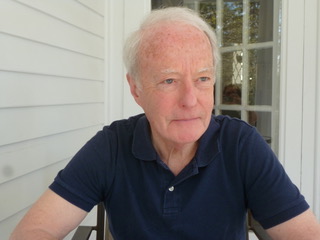Writhing in the tall stacks,
Hands held high against the books,
She eyed him with a flaming look
As he passed in scholarly innocence,
Searching for a quotable line
For a talk he’d soon deliver.
His topic being the coming crisis
In western society, whose author’s thesis
Was how covert assumptions cast
A shadow on a thinker’s pride
When not admitted openly.
He planned to emphasize that author’s own
Secret thoughts, what prompted him
To make such claims about others
As if he weren’t their sly brother.
After his revealing talk,
He madly rushed
Back to the church of books
Hoping to catch the flaming look
That so aroused his scholarly focus.
This time not to find a quotable line
To dazzle faces set around a table
Eager to enable intellectual fables
Of why ideas so crippled them.
His mind was strung with other thoughts
That needed no quotable validation,
Filled as his chest was with palpitation
Barely concealing the burning wish
That his lady of the stacks still lingered
Between fact and fiction, still wishing
To bring him down to solid ground
From which scholars tend to rise.
But she was gone, as any wakeful person
Would expect. In the long aisle of books
From which she cast that flaming look
He found the spot where she was standing.
Up where her hot hands had rested
A note was taped upon a certain spine:
The Collected Poems of W. B Yeats.
“I’m sorry you missed me,” she wrote,
“but don’t miss the poem on page 91.”
He opened and read the words of crazy Yeats:
“The fascination of what’s difficult
Has dried the sap out of my veins, and rent
Spontaneous joy and natural content
Out of my heart. There’s somethings ails our colt.”
What gain his classical training, the Latin
Phrasing, the complex sentences, sociology
Of sociology, vocabulary to stun the stars.
Did Catullus spend his days on epistemology?
Then he noticed her note continued on the back,
“I’ll soon be leaving the university
To enter the world where war is raging
And passionate poets are needed.
Maybe Yeats was wrong the day he wrote
That all that’s beautiful floats away like water.
He sure was right ‘wine comes in at the mouth
And love comes in at the eye, that’s all
We shall know for truth
Before we grow old and die.
I lift the glass to my mouth
I look at you and sigh.’
Goodbye.”

Thanks, Ed, for reaching the existential dimension of life in this evocative poem. On the most fundamental level, I believe, genuine art, transcending entertainment, constitutes the most powerful and persistent challenge to what we have come to call neoliberalism, the ultimate goal of which is the futile attempt to commodify the human spirit. Thus, despite all appearances, that system has set itself up to fail, and in that, I also believe, lies our hope and courage and confidence.
I agree about genuine art, Newton. It is our hope. Ed